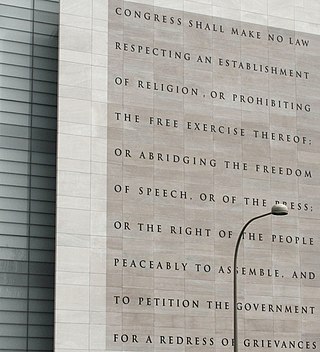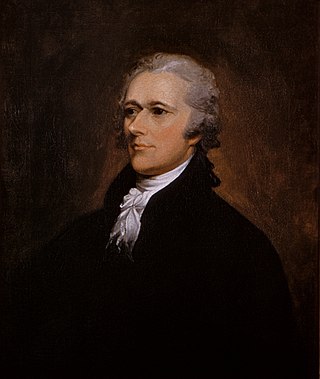Related Research Articles

Defamation is a communication that injures a third party's reputation and causes a legally redressable injury. The precise legal definition of defamation varies from country to country. It is not necessarily restricted to making assertions that are falsifiable, and can extend to concepts that are more abstract than reputation – like dignity and honour. In the English-speaking world, the law of defamation traditionally distinguishes between libel and slander. It is treated as a civil wrong, as a criminal offence, or both.

The Sixth Amendment to the United States Constitution sets forth rights related to criminal prosecutions. It was ratified in 1791 as part of the United States Bill of Rights. The Supreme Court has applied all but one of this amendment's protections to the states through the Due Process Clause of the Fourteenth Amendment.
Gertz v. Robert Welch, Inc., 418 U.S. 323 (1974), was a landmark decision of the US Supreme Court establishing the standard of First Amendment protection against defamation claims brought by private individuals. The Court held that, so long as they do not impose liability without fault, states are free to establish their own standards of liability for defamatory statements made about private individuals. However, the Court also ruled that if the state standard is lower than actual malice, the standard applying to public figures, then only actual damages may be awarded.

In the United States, freedom of speech and expression is strongly protected from government restrictions by the First Amendment to the U.S. Constitution, many state constitutions, and state and federal laws. Freedom of speech, also called free speech, means the free and public expression of opinions without censorship, interference and restraint by the government. The term "freedom of speech" embedded in the First Amendment encompasses the decision what to say as well as what not to say. The Supreme Court of the United States has recognized several categories of speech that are given lesser or no protection by the First Amendment and has recognized that governments may enact reasonable time, place, or manner restrictions on speech. The First Amendment's constitutional right of free speech, which is applicable to state and local governments under the incorporation doctrine, prevents only government restrictions on speech, not restrictions imposed by private individuals or businesses unless they are acting on behalf of the government. However, It can be restricted by time, place and manner in limited circumstances. Some laws may restrict the ability of private businesses and individuals from restricting the speech of others, such as employment laws that restrict employers' ability to prevent employees from disclosing their salary to coworkers or attempting to organize a labor union.
Symbolic speech is a legal term in United States law used to describe actions that purposefully and discernibly convey a particular message or statement to those viewing it. Symbolic speech is recognized as being protected under the First Amendment as a form of speech, but this is not expressly written as such in the document. One possible explanation as to why the Framers did not address this issue in the Bill of Rights is because the primary forms for both political debate and protest in their time were verbal expression and published word, and they may have been unaware of the possibility of future people using non-verbal expression. Symbolic speech is distinguished from pure speech, which is the communication of ideas through spoken or written words or through conduct limited in form to that necessary to convey the idea.
Crawford v. Washington, 541 U.S. 36 (2004), is a landmark United States Supreme Court decision that reformulated the standard for determining when the admission of hearsay statements in criminal cases is permitted under the Confrontation Clause of the Sixth Amendment. The Court held that prior testimonial statements of witnesses who have since become unavailable may not be admitted without cross-examination.
The party admission, in the law of evidence, is a type of statement that appears to be hearsay but is generally exempted (excluded) from the definition of hearsay because it was made by a party to the litigation adverse to the party introducing it into evidence.

Federalist No. 75 is an essay by Alexander Hamilton and seventy-fifth in the series of The Federalist Papers. It was published on March 26, 1788 under the pseudonym Publius, the name under which all The Federalist papers were published. Its title is "The Treaty Making Power of the Executive", and it is the ninth in a series of 11 essays discussing the powers and limitations of the Executive branch.
Georgian Public Broadcaster is the national public broadcaster of Georgia.
Hearsay, in a legal forum, is an out-of-court statement which is being offered in court for the truth of what was asserted. In most courts, hearsay evidence is inadmissible unless an exception to the hearsay rule applies.
Garcetti v. Ceballos, 547 U.S. 410 (2006), is a U.S. Supreme Court decision involving First Amendment free speech protections for government employees. The plaintiff in the case was a district attorney who claimed that he had been passed up for a promotion for criticizing the legitimacy of a warrant. The Court ruled, in a 5–4 decision, that because his statements were made pursuant to his position as a public employee, rather than as a private citizen, his speech had no First Amendment protection.
Rankin v. McPherson, 483 U.S. 378 (1987), is a major decision of the Supreme Court of the United States concerning the First Amendment, specifically whether the protection of the First Amendment extends to government employees who make extremely critical remarks about the President. The Court ruled that, while direct threats on the President's life would not be protected speech, a comment — even an unpopular or seemingly extreme one — made on a matter of public interest and spoken by a government employee with no policymaking function and a job with little public interaction, would be protected.
In United States law, a declarationagainst interest is an exception to the rule on hearsay in which a person's statement may be used, where generally the content of the statement is so prejudicial to the person making it that they would not have made the statement unless they believed the statement was true. For example, if a driver in an automobile accident boasts publicly that they were speeding, it may represent a legal admission of liability. The Federal Rules of evidence limit the bases of prejudices to the declarant to tort and criminal liability. Some states, such as California, extend the prejudice to "hatred, ridicule, or social disgrace in the community." It is analogous to the criminal equivalent, the statement against penal interest which is a statement that puts the person making the statement at risk of prosecution. In the United States federal court system and many state courts, statements against interest by individuals who are not available to be called at trial may be admitted as evidence where in other circumstances they would be excluded as hearsay.
Modern libel and slander laws in many countries are originally descended from English defamation law. The history of defamation law in England is somewhat obscure; civil actions for damages seem to have been relatively frequent as far back as the Statute of Gloucester in the reign of Edward I (1272–1307). The law of libel emerged during the reign of James I (1603–1625) under Attorney General Edward Coke who started a series of libel prosecutions. Scholars frequently attribute strict English defamation law to James I's outlawing of duelling. From that time, both the criminal and civil remedies have been found in full operation.

Proposition 3, the Children's Hospital Bond Act of 2008, is a law that was enacted by California voters by means of the initiative process. It is a bond issue that authorizes $980 million in bonds, to be repaid from state's General Fund, to fund the construction, expansion, remodeling, renovation, furnishing and equipping of children's hospitals. The annual payment on the debt authorized by the initiative is approximately $64 million a year. Altogether, the measure would cost about $1.9 billion over 30 years out of California's general fund.
Threatening the president of the United States is a federal felony under United States Code Title 18, Section 871. It consists of knowingly and willfully mailing or otherwise making "any threat to take the life of, to kidnap, or to inflict great bodily harm upon the president of the United States". The law also includes presidential candidates, vice presidents, and former presidents. The Secret Service investigates suspected violations of this law and monitors those who have a history of threatening the president. Threatening the president is considered a political offense. Immigrants who commit this crime can be deported.

Cook v. Gates, 528 F.3d 42, is a decision on July 9, 2008, of the United States Court of Appeals for the First Circuit that upheld the "Don't ask, Don't tell" (DADT) policy against due process and equal protection Fifth Amendment challenges and a free speech challenge under the First Amendment, and which found that no earlier Supreme Court decision held that sexual orientation is a suspect or quasi-suspect classification.
United States v. Alvarez, 567 U.S. 709 (2012), is a landmark decision in which the Supreme Court of the United States ruled that the Stolen Valor Act of 2005 was unconstitutional. The Stolen Valor Act of 2005 was a federal law that criminalized false statements about having a military medal. It had been passed by Congress as an effort to stem instances where people falsely claimed to have earned the medal in an attempt to protect the valor of legitimate recipients. A 6–3 majority of the Supreme Court agreed that the law was unconstitutional and violated the free speech protections under the First Amendment. Despite reaffirming the opinion that was previously issued by the Ninth Circuit, it could not agree on a single rationale. Four justices concluded that a statement's falsity is not enough, by itself, to exclude speech from First Amendment protection. Another two justices concluded that while false statements were entitled to some protection, the Stolen Valor Act of 2005 was invalid because it could have achieved its objectives in less restrictive ways.
In United States constitutional law, false statements of fact are assertions, which are ostensibly facts, that are false. Such statements are not always protected by the First Amendment. Often, this is due to laws against defamation, that is making statements that harm the reputation of another. In those cases, freedom of speech comes into conflict with the right to privacy. Because it is almost impossible for someone to be absolutely sure that what they say is true, a party who makes a false claim isn't always liable. Whether such speech is protected depends on the situation. The standards of such protection have evolved over time from a body of Supreme Court rulings.
Washington v. Texas, 388 U.S. 14 (1967), is a United States Supreme Court case in which the Court decided that the Compulsory Process Clause of the Sixth Amendment to the Constitution is applicable in state courts as well as federal courts. Jackie Washington had attempted to call his co-defendant as a witness, but was blocked by Texas courts because state law prevented co-defendants from testifying for each other, under the theory that they would be likely to lie for each other on the stand.
References
- ↑ See Fed. R. Evid. 804(b)(4), available at https://www.law.cornell.edu/rules/fre